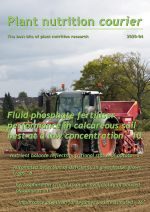-
Email newsletter November 2020
This email newsletter is the notification of the just published Plant nutrition courier 2020-04 issue.
 Fluid phosphate fertiliser performance in calcareous soil is best at a low concentration
Fluid phosphate fertiliser performance in calcareous soil is best at a low concentration
Diluted fluid phosphate fertilisers outperform concentrated equivalents in mildly calcareous soils. Kansas State University researchers observed this difference between concentrated and diluted fluid fertilisers in lab experiments. They urge to revisit the use of soil testing solutions and accompanying fertiliser recommendations when polyphosphate-based fluid fertilisers will be applied.
To the full story
 Fertosphere-pH crucial to plant-availability of banded phosphorus
Fertosphere-pH crucial to plant-availability of banded phosphorus
Water-soluble phosphate fertilisers differently affect the pH of the fertosphere. The pH of this fertiliser-enriched zone is of paramount importance to the plant-availability of band-applied fertiliser phosphorus. Phosphorus dose and soil properties also affect the fertosphere-pH, Australian researchers found in a laboratory study.
To the full story
Other fertiliser news:
• Polyhalite less leaching-sensitive than equivalent sulphate salts emissions
• Dual-release granular urea fertiliser
• Glauconite milled into potassium fertiliser
• Adjusting the phosphorus-availability of biochar
• Iron(III) phosphate nanofertiliser differently utilised
 Nutrient balance reflects nutritional status of potato
Nutrient balance reflects nutritional status of potato
Every potato variety has a unique balance of nutrient concentrations. Canadian scientists are exploring whether such balances can be used to diagnose the nutritional status of potato crops. They found that cultivars can be grouped according their nutrient balances. This approach can help to classify new cultivars in the appropriate group.
To the full story
Other soil and plant analysis news:
• Tuber nitrogen content is risk factor associated with tuber greening
• New indices for potato nitrogen status and tuber quality
• Previous-year phosphorus nutrition index indicates phosphorus fertiliser need of maize
• Determination of P and K in (in)organic fertilisers
• Arginine concentration indicates nitrogen status of peach
• Soil nitrite concentrations indicate hotspots and hot moments of nitrous oxide emissions
 Foliar-applied urease inhibitor starves plant-pathogenic fungi
Foliar-applied urease inhibitor starves plant-pathogenic fungi
Fungi that penetrate plants via above-ground parts have to bridge a nitrogen deficiency gap at early stages of the infection process. They do so by degrading own purine into ammonia. Inhibition of the purine degradation pathway using a urease inhibitor can significantly reduce successful infection.
To the full story

 Automated detection of deficiency in greenhouse-grown crops
Automated detection of deficiency in greenhouse-grown crops
Scientists have developed an automated remote sensing system to monitor the health of greenhouse-grown crops at sunset with help of a hyperspectral camera. A proof-of-concept study demonstrated the monitoring of the macronutrient status of pak choi (bok choy) and spinach as part of an on-going research effort to optimise and automate monitoring of greenhouse-grown crops.
Photograph: UC Davis
To the full story
 Adjusting nutrient solution allows growth at low pH to limit root rot spread
Adjusting nutrient solution allows growth at low pH to limit root rot spread
A low pH of the hydroponic nutrient solution can significantly reduce the incidence of root diseases. Any nutritional problems associated with a low pH in the rootzone can be overcome by adjusting the micronutrient concentrations in the nutrient solution, according to a study into a new nutrient solution management strategy for growing leafy greens at low pH to reduce the spread of root rot and other diseases via the hydroponic solution.
To the full story

 Importance of silicon for legumes underestimated
Importance of silicon for legumes underestimated
Silicon is broadly beneficial to legumes. Several researchers have also provided evidence that silicon promotes the legume–rhizobia interaction. Scientists therefore ask the rhetorical question: “Is it time to include legumes in plant silicon research?”
To the full story
 Single issue
Single issue
Click here for a single issue of the Plant nutrition courier.
Information about Plant nutrition courier
Free issue (Extra thick 2020-02 issue, 2.4 Mb)Subscriptions
Plant nutrition courier
Please let us know if you are not interested in news about plant nutrition.